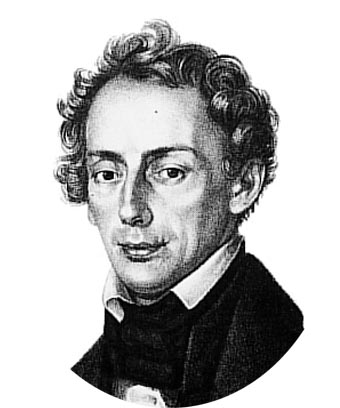<Back to Index>
- Physicist Christian Johann Doppler, 1803
- Architect Gottfried Semper, 1803
- Président de la République Française Jacques René Chirac, 1727
PAGE SPONSOR

Christian Johann Doppler (29 November 1803 – 17 March 1853) was an Austrian mathematician and physicist. He is most famous for what is now called the Doppler effect, which is the apparent change in frequency and wavelength of a wave as perceived by an observer moving relative to the wave's source.
Christian Doppler was born in Salzburg, Austria, the son of a stone-mason. Doppler could not work in his father's business because of his generally weak physical condition. After completing high school Doppler studied astronomy and mathematics in Vienna and Salzburg and started to work at the Prague Polytechnic (now Czech Technical University), where he was appointed.
Only a year later, at the age of 39, Doppler published his most notable work, "Über das farbige Licht der Doppelsterne und einiger anderer Gestirne des Himmels" (On the coloured light of the binary stars and some other stars of the heavens). In this work, Doppler postulated his principle (later coined the Doppler effect) that the observed frequency of a wave depends on the relative speed of the source and the observer, and he tried to use this concept for explaining the colour of binary stars. The Doppler effect of sound was verified by Buys Ballot in 1845. In Doppler's time in Prague as a professor he published over 50 articles on mathematics, physics and astronomy. In 1847 he left Prague for the professorship of mathematics, physics, and mechanics at the Academy of Mines and Forests in Schemnitz (Banská Štiavnica, Slovakia), and in 1849 he moved to Vienna.
Doppler's research in Prague was interrupted by the revolutionary incidents of March 1848, when he fled to Vienna. There he was appointed head of the Institute for Experimental Physics at the University of Vienna in 1850. During his time there, Doppler, along with Franz Unger, played an influential role in the development of young Gregor Mendel, known as the founding father of genetics, who was a student at the University of Vienna from 1851 to 1853.
Doppler died on 17 March 1853 at age 49 from a pulmonary disease in Venice (also at that time part of the Austrian Empire). His tomb is just inside the entrance of the Venetian island cemetery of San Michele.